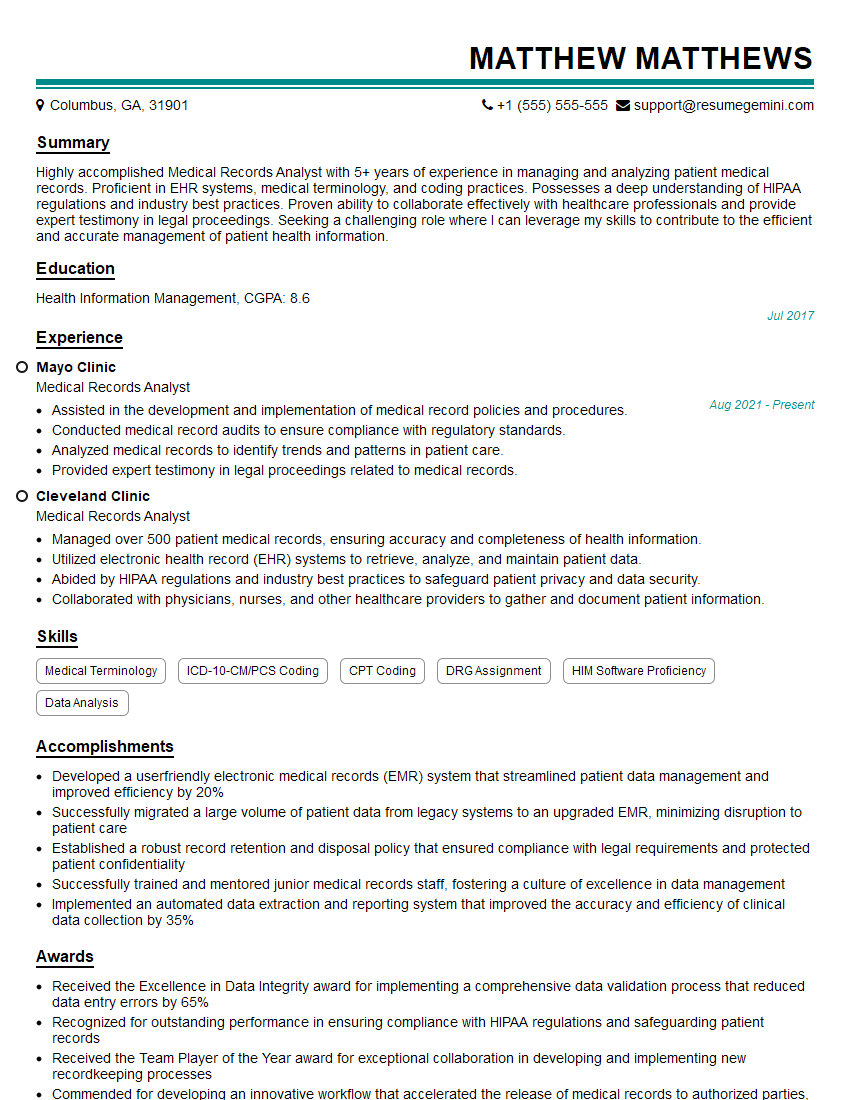Are you a seasoned Medical Records Analyst seeking a new career path? Discover our professionally built Medical Records Analyst Resume Template. This time-saving tool provides a solid foundation for your job search. Simply click “Edit Resume” to customize it with your unique experiences and achievements. Customize fonts and colors to match your personal style and increase your chances of landing your dream job. Explore more Resume Templates for additional options.

Matthew Matthews
Medical Records Analyst
Summary
Highly accomplished Medical Records Analyst with 5+ years of experience in managing and analyzing patient medical records. Proficient in EHR systems, medical terminology, and coding practices. Possesses a deep understanding of HIPAA regulations and industry best practices. Proven ability to collaborate effectively with healthcare professionals and provide expert testimony in legal proceedings. Seeking a challenging role where I can leverage my skills to contribute to the efficient and accurate management of patient health information.
Education
Health Information Management
July 2017
Skills
- Medical Terminology
- ICD-10-CM/PCS Coding
- CPT Coding
- DRG Assignment
- HIM Software Proficiency
- Data Analysis
Work Experience
Medical Records Analyst
- Assisted in the development and implementation of medical record policies and procedures.
- Conducted medical record audits to ensure compliance with regulatory standards.
- Analyzed medical records to identify trends and patterns in patient care.
- Provided expert testimony in legal proceedings related to medical records.
Medical Records Analyst
- Managed over 500 patient medical records, ensuring accuracy and completeness of health information.
- Utilized electronic health record (EHR) systems to retrieve, analyze, and maintain patient data.
- Abided by HIPAA regulations and industry best practices to safeguard patient privacy and data security.
- Collaborated with physicians, nurses, and other healthcare providers to gather and document patient information.
Accomplishments
- Developed a userfriendly electronic medical records (EMR) system that streamlined patient data management and improved efficiency by 20%
- Successfully migrated a large volume of patient data from legacy systems to an upgraded EMR, minimizing disruption to patient care
- Established a robust record retention and disposal policy that ensured compliance with legal requirements and protected patient confidentiality
- Successfully trained and mentored junior medical records staff, fostering a culture of excellence in data management
- Implemented an automated data extraction and reporting system that improved the accuracy and efficiency of clinical data collection by 35%
Awards
- Received the Excellence in Data Integrity award for implementing a comprehensive data validation process that reduced data entry errors by 65%
- Recognized for outstanding performance in ensuring compliance with HIPAA regulations and safeguarding patient records
- Received the Team Player of the Year award for exceptional collaboration in developing and implementing new recordkeeping processes
- Commended for developing an innovative workflow that accelerated the release of medical records to authorized parties, meeting all legal and regulatory requirements
Certificates
- Registered Health Information Technician (RHIT)
- Certified Coding Associate (CCA)
- Certified Coding Specialist (CCS)
- Certified Healthcare Privacy and Security Specialist (CHPS)
Career Expert Tips:
- Select the ideal resume template to showcase your professional experience effectively.
- Master the art of resume writing to highlight your unique qualifications and achievements.
- Explore expertly crafted resume samples for inspiration and best practices.
- Build your best resume for free this new year with ResumeGemini. Enjoy exclusive discounts on ATS optimized resume templates.
How To Write Resume For Medical Records Analyst
- Highlight your proficiency in medical terminology, coding practices, and EHR systems.
- Quantify your accomplishments whenever possible, using specific metrics to demonstrate your impact.
- Showcase your understanding of HIPAA regulations and industry best practices.
- Emphasize your ability to collaborate effectively with healthcare professionals.
- Consider obtaining additional certifications, such as the Certified Medical Record Professional (CMRP) or the Registered Health Information Technician (RHIT).
Essential Experience Highlights for a Strong Medical Records Analyst Resume
- Managed over 500 patient medical records, ensuring accuracy and completeness of health information.
- Utilized electronic health record (EHR) systems to retrieve, analyze, and maintain patient data.
- Abided by HIPAA regulations and industry best practices to safeguard patient privacy and data security.
- Collaborated with physicians, nurses, and other healthcare providers to gather and document patient information.
- Conducted medical record audits to ensure compliance with regulatory standards.
- Analyzed medical records to identify trends and patterns in patient care.
- Provided expert testimony in legal proceedings related to medical records.
Frequently Asked Questions (FAQ’s) For Medical Records Analyst
What are the essential skills required for a Medical Records Analyst?
Essential skills include: medical terminology, coding practices (ICD-10-CM/PCS, CPT), DRG assignment, HIM software proficiency, data analysis, and a strong understanding of HIPAA regulations.
What are the primary responsibilities of a Medical Records Analyst?
Primary responsibilities include: managing and analyzing patient medical records, ensuring accuracy and completeness of health information, utilizing EHR systems, abiding by HIPAA regulations, collaborating with healthcare providers, conducting medical record audits, and analyzing medical records to identify trends and patterns in patient care.
What are the career prospects for a Medical Records Analyst?
Medical Records Analysts are in high demand due to the increasing emphasis on patient privacy and data security. Career prospects include advancement to supervisory or management roles, specialization in a particular area of healthcare (e.g., oncology, cardiology), or pursuing a related field such as health information management.
What is the average salary for a Medical Records Analyst?
According to the U.S. Bureau of Labor Statistics, the median annual salary for Medical Records and Health Information Technicians was $45,760 in May 2021. Salaries can vary based on experience, location, and employer.
What are some tips for writing a standout Medical Records Analyst resume?
Tips for writing a standout resume include: highlighting your proficiency in medical terminology, coding practices, and EHR systems; quantifying your accomplishments using specific metrics; showcasing your understanding of HIPAA regulations and industry best practices; emphasizing your ability to collaborate effectively with healthcare professionals; and considering obtaining additional certifications.